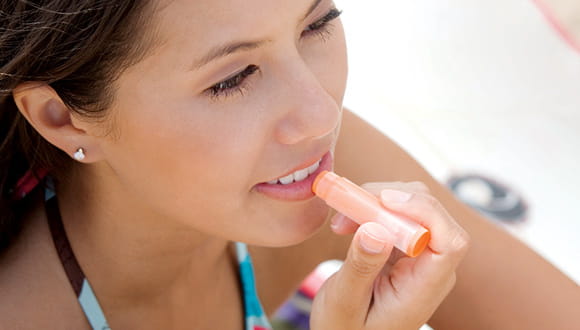Why Are My Lips Always Dry? (& 5 At-Home Remedies to Soothe Chapped Lips)
Sep. 30, 2021 - Katie McCallumThere are two types of people in this world: Those who know where their nearest lip balm is stashed at all times (and, in fact, have lip balm stashes — plural), and those who only have to hunt lip balm down a few times a year, usually when it's cold and windy out.
Regardless, we can all agree that, with symptoms ranging from dry and irritated lips to ones that are flaky, cracked and even bloody, chapped lips are annoying.
Whether you get them frequently or just on occasion, here's everything you need to know about what causes chapped lips, how to avoid dry lips and how to treat them once they're chapped — as well as what to do when chapped lips just won't heal.
What do chapped lips mean?
Our lips are one of the thinnest layers of skin on our bodies, making them fairly prone to drying out. They're also packed with nerve endings that help us sense the outside world, including temperature, taste and more.
Basically, they're pretty sensitive.
When your lips are chapped, it means they've become too dry or irritated for one reason or another.
The most common reason for chapped lips is exposure to dry, chilly air. But this isn't the only reason your lips might be chapped.
Why do some people get chapped lips in the summer?
It's one thing to have a short-lived bout of chapped lips in the winter. But what about those who get chapped lips year-round, including when it's humid and hot out?
According to the American of Dermatology, other common chapped lip causes include:
- Licking your lips too frequently
- Spicy food
- Sun exposure
- Certain medications and supplements
- Infection
- Allergic reaction to a product
- Certain underlying health conditions
Saliva, spicy food, the sun and certain products can be irritating to your lips, while some medications and health conditions can cause your lips to be drier than usual. For instance, medications that cause dry mouth can also lead to drier lips. And dry lips can also be a complication of Crohn's disease, certain vitamin deficiencies and other underlying health conditions.
If you're getting chapped lips frequently, talk to your doctor. He or she can help you identify the cause of your chapped lips and the best way to treat them, which might be as simple as following a more purposeful lip care routine like the one below.
Are there any at-home chapped lip remedies?
Whether your chapped lips are a one-time thing or a frequent nuisance, here are five ways dermatologists suggest to avoid or treat chapped lips:
- Choose a moisturizing lip balm. To prevent chapped lips, regularly apply a lip balm that actively works to lock in moisture, such as one with a petroleum jelly or parafin base. You may need to apply it more frequently in cold, dry weather or if your lips are already chapped.
- Avoid irritating lip products. Not all lip balms are created equal. And you may be surprised to find that some of the more popular lip balm brands contain ingredients that may actually be irritating your lips, including peppermint flavoring, menthol, camphor and salicylic acid. Don't confuse the burning, stinging or tingling these ingredients cause for actual chapped lip relief.
- Add some SPF to your lips if you're going outdoors. Use a lip balm with an SPF of at least 30 when out in the sun. Protecting your lips helps prevent them from drying out. If your lips are already cracked, know that they can burn even easier. A lip balm with SPF can also help prevent your lip situation from getting even worse.
- Avoid licking your lips. Whether it's a subconscious habit or you're doing it because your lips feel dry, just know that, as saliva evaporates, it can dry out (or further dry out) your lips.
- Hydrate! Since chapped lips are caused by dryness, be sure you're drinking plenty of water every day.
How long does it take chapped lips to heal?
Chapped lips can take anywhere from days to weeks to heal, with the exact timeline depending on the severity of your symptoms and whether the dryness or irritant has been successfully treated or removed, respectively.
Lightly dried out lips can improve in just a few days with the right at-home treatments, while more severe chapped lips —ones that are cracked and bleeding — will take longer to heal.
When chapped lips aren't healing or are chronic, be sure to speak to your dermatologist. As mentioned, chapped lips can be a secondary result of taking some medications and, while rare, certain underlying health conditions. Your doctor can rule out whether this is the case, as well as determine a treatment plan that works to heal your lips.


